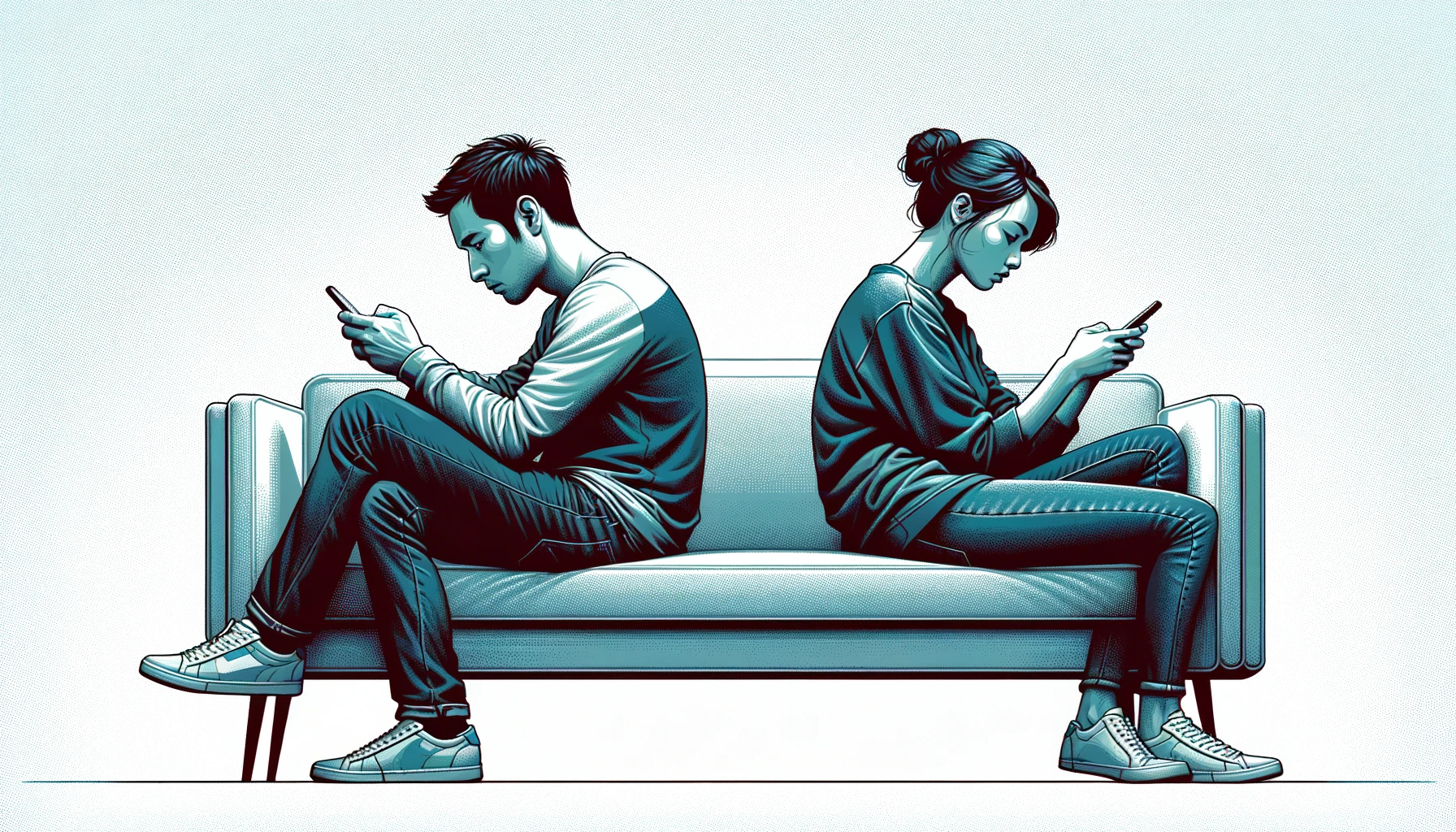Sharing is caring!
Have you ever wondered why some couples who seem really happy together suddenly stop being close and cuddly?
It’s something that happens a lot, but people don’t talk about it much.
Being physically close is a big part of being in a relationship. It’s how couples show they love and care for each other without saying a word.
But sometimes, even when two people love each other a lot, they can start feeling more like roommates than partners.
There are many reasons why this can happen, and it’s not always obvious. Maybe they’re super busy and tired all the time, or they’re stressed about money or work.
Sometimes, they might not feel great about themselves or they’re just caught up in taking care of their kids. Or, they might not talk about their feelings much, which can make them feel distant.
Understanding why couples might stop being physically close can help them figure out how to fix it
1. Communication Breakdown
Now, let’s talk about when the wires get crossed in communication.
Sometimes, couples stop being physically intimate because they’re not talking about it – or about anything meaningful, really.
Conversations might be limited to “Did you pick up the milk?” or “What’s happening with the school fundraiser?”
Without deep, engaging conversations, that emotional connection starts to weaken. And guess what?
A strong emotional bond is like the secret sauce to physical intimacy. When that bond weakens, the physical aspect of the relationship often follows suit.
Not talking about your needs and desires can lead to misunderstandings and resentment, too.
Maybe one partner feels neglected but doesn’t voice it, hoping the other will somehow pick up on the unspoken cues.
Meanwhile, the other partner might be clueless about how to bring back the spark or might even be unaware there’s an issue.
This silence around physical intimacy can create a gap that gets wider over time, making it harder and harder to bridge the distance and rekindle that connection.
2. Lack of Novelty

Ever notice how exciting everything is when a relationship first starts?
You’re exploring new territory together, and every touch is electrifying. But over time, predictability creeps in.
The same old routines, both in daily life and in the bedroom, can turn what was once thrilling into something that feels a lot more like going through the motions.
Humans crave variety and excitement; when those elements vanish, so too can the desire for physical intimacy.
Suddenly, what used to be a fireworks show feels more like a flickering candle – nice, but not exactly breathtaking.
Keeping things fresh isn’t just about grand gestures or exotic vacations. It’s the little changes and surprises that can reignite interest.
However, without those, the physical connection between partners can start feeling stale.
You start longing for the butterflies that seem to have flown away, leaving behind a longing for something that once was but is no longer.
[Related: 12 Common Reasons Married Couples Grow Apart]
3. Health Issues
Physical health plays a massive role in intimacy. Conditions like diabetes, high blood pressure, or hormonal imbalances can directly impact one’s libido and performance.
Even less severe issues, like back pain or minor illnesses, can make the idea of getting physically close less appealing.
Medications for these conditions can also come with side effects that reduce desire or make intimacy less enjoyable.
Essentially, when your body isn’t feeling its best, getting in the mood for intimacy is a lot harder.
Beyond physical health, mental health struggles like depression and anxiety can deeply affect your sex drive.
These conditions can create a fog that’s hard to see through, making intimacy feel like another mountain to climb rather than a source of comfort and connection.
When either partner is grappling with these issues, the physical aspect of their relationship often takes a backseat, overshadowed by the immediate need to manage health and well-being.
4. Changed Priorities

As life evolves, so do priorities. Maybe early in the relationship, shared physical intimacy was high on the list.
Fast forward a few years, and you might find that career goals, parenting, or personal projects have shuffled to the top.
It’s not that the desire for closeness disappears; it’s just that other things demand attention and energy first.
When both partners are chasing their own goals or focusing on family needs, carving out time for each other becomes challenging.
This shift isn’t necessarily a bad thing. Growth and change are part of life.
However, when physical intimacy slides off the priority list, it can leave both partners feeling disconnected.
Without realizing it, what was once a vibrant part of the relationship can start to wither, overshadowed by the hustle and bustle of daily life and the pursuit of other dreams.
5. Trust Issues
Trust is the foundation of any strong relationship, including the physical aspect.
When trust is damaged, through infidelity, lying, or even just the accumulation of small betrayals over time, the intimacy shared between partners can suffer a major blow.
Feeling safe and secure with one another is crucial for vulnerability and openness, which are key components of a healthy intimate life.
If you’re constantly worried about getting hurt or questioning your partner’s commitment, letting down your guard becomes a monumental task.
Rebuilding trust is a long and often difficult road. During this process, physical intimacy might take a backseat as the emotional wounds heal.
The uncertainty and fear that accompany trust issues can act as barriers to reconnecting on a physical level, turning what was once a source of joy and connection into a field of emotional landmines.
6. Stress and Fatigue
Imagine juggling work, home responsibilities, and maybe a couple of kids. That daily grind doesn’t just eat into your free time; it saps your energy too.
When couples find themselves buried under a mountain of stress and exhaustion, their intimate life often takes the first hit.
Feeling tired isn’t just about lacking physical energy; it’s also about having little to no mental space for romance.
You know how it goes – after a long day, the couch and your favorite TV show seem far more appealing than any intimate activities.
Moreover, stress isn’t just an energy-zapper; it’s a mood killer, too. When your brain is preoccupied with deadlines and to-do lists, it’s hard to switch gears and get in the mood for intimacy.
Financial worries, job pressures, or concerns about the kids can create a mental barrier that feels almost impossible to break down at the end of the day.
As this cycle of stress and fatigue continues, physical intimacy starts sliding down the priority list, often without couples even realizing it.
7. Technology Overload

Ever noticed how screens seem to follow us everywhere?
The bedroom, once a sanctuary for couples, is now often invaded by the glow of smartphones and tablets.
With notifications buzzing and the temptation to scroll through social media or check the latest work emails, the digital world can create a significant barrier to intimacy.
Instead of winding down together, partners end up in their own tech bubbles, physically close but miles apart in every other sense.
The more engrained these habits become, the harder it is to break free and reconnect on a physical level.
Not to mention, binge-watching series can lead to late nights where one or both partners end up too tired for anything other than sleep.
Technology, for all its benefits, can easily become a third wheel in relationships, diluting the moments that could be spent in each other’s arms with distractions that seem urgent but aren’t.
8. Self-Image Issues
Feeling good about oneself plays a huge role in desire and intimacy.
When individuals struggle with their body image, it can create a ripple effect, impacting not just how they see themselves but also how they believe their partner sees them.
Concerns about weight, appearance, or aging can lead to a reluctance to be vulnerable and naked with someone else.
The logic often goes, “If I don’t find myself attractive, how could they?” This mindset can act as a formidable barrier to physical closeness, as one might shy away from intimacy out of fear of judgment or rejection.
Moreover, society’s standards of beauty and constant exposure to airbrushed perfection can exacerbate these feelings, making it difficult for individuals to appreciate their own unique qualities.
The pressure to measure up can be overwhelming, casting a shadow over intimate moments and making it hard to let go and enjoy the connection with their partner.
9. Parenting Demands

Let’s talk about parenting for a sec. Kids are wonderful, but they’re also like adorable little energy vampires.
From the baby years with their sleepless nights to the taxi service parents become for their school-aged kids, parenting can leave little room for anything else.
Finding time for intimacy when you’re constantly interrupted by cries or questions about where socks go can feel impossible.
The privacy needed for those intimate moments becomes a rare commodity, often pushed to the bottom of the list after family obligations.
Moreover, parenting isn’t just physically exhausting; it’s mentally draining too. Worrying about your kids, their future, and how to keep them happy and healthy can consume your thoughts, leaving little room for thoughts of romance.
Suddenly, you’re partners in parenting first, and lovers second, trying to remember how to switch back.
10. Mismatched Libidos
People naturally have different levels of sexual desire, and it’s not uncommon for couples to find that theirs don’t always align.
One partner might be ready to go at the drop of a hat, while the other might need a bit more to get in the right headspace—or might not feel the urge as often.
These discrepancies can lead to feelings of rejection and frustration on both sides. The partner with the higher libido might feel neglected, while the one with less desire may feel pressured or guilty for not being ‘in the mood’ as often.
Navigating these differences requires communication and understanding, but without those, it’s easy for physical intimacy to dwindle.
The challenge becomes not just about finding the right moment but about understanding and respecting each other’s needs and finding a middle ground that works for both.
[Interesting: How To Have A Great Couples Time With Your Spouse]
What Do You Do When You Stop Being Physically Intimate With Your Partner
If you and your partner aren’t being close and cuddly like you used to, the first thing to do is talk about it.
It might feel a bit weird or hard to start this chat, but it’s really important. You can pick a good time when you’re both relaxed and not busy with other stuff.
Then, share how you’re feeling in a kind way. Say something like, “I’ve noticed we’re not as close as we used to be, and I miss that.
What do you think?” This opens the door for both of you to talk about your feelings and what you both might want to change.
After talking, try to come up with some ideas together to bring back the closeness. Maybe plan special dates or little moments together, like watching a movie or going for a walk.
It’s also good to remember that being close doesn’t always mean being romantic. Just doing fun stuff together or laughing can make you feel closer.
The key is to keep talking and make time for each other, even if you’re really busy. It’s like being a team; when you both work together, you can get through tough times and become closer again.
Sharing is caring!
